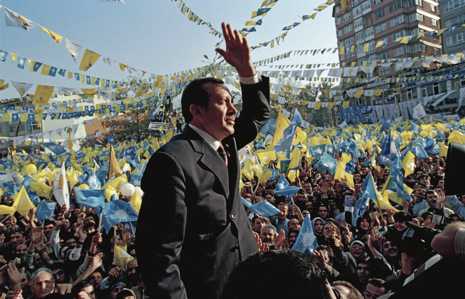
Quick: What country jails the most journalists?
If you guessed China, you were close, but no cigar. Twenty-seven reporters are in prison there, according to the Committee to Protect Journalists in New York. If you guessed Iran, you’re getting warmer—forty-two in prison there—but you’re still off.
How many of you guessed Turkey?
Measuring strictly in terms of imprisonments, Turkey—a longtime American ally, member of NATO, and showcase Muslim democracy—appears to be the most repressive country in the world.
According to the Journalists Union of Turkey, ninety-four reporters are currently imprisoned for doing their jobs. More than half are members of the Kurdish minority, which has been seeking greater freedoms since the Turkish republic was founded, in 1923. Many counts of arrested journalists go higher; the Friends of Ahmet Sik and Nedim Sener, a group of reporters named for two imprisoned colleagues, has compiled a detailed list of a hundred and four journalists currently in prison there.
The arrests have created an extraordinary climate of fear among journalists in Turkey, or, for that matter, for anyone contemplating criticizing Prime Minister Recep Tayyip Erdogan’s government. During my recent visit there, many Turkish reporters told me that their editors have told them not to criticize Erdogan. As I detail in my piece in the magazine this week, the arrests of journalists are part of a larger campaign by Erdogan to crush domestic opposition to his rule. Since 2007, more than seven hundred people have been arrested, including members of parliament, army officers, university rectors, the heads of aid organizations, and the owners of television networks.
Mind you, Turkey is a democracy, or at least, it’s supposed to be. Erdogan’s triumph, and that of his party, in 2002, represented an epochal shift in Turkey’s political history. The election threw out an entrenched secular minority that had governed the country since its founding, often suppressing the majority of moderately religious Turks. In his nine years in power, Erdogan has transformed Turkish society in many positive ways. But, more and more, Erdogan’s Turkey is coming to resembled Putin’s Russia—a kind of one-party democracy.
If you bring this up with Turkish authorities, you won’t get very far. When I raised the issue of domestic repression with Ahmet Davutoglu, the Turkish foreign minister, last month, he told me in an irritated voice that his government wasn’t responsible. Ibrahim Kalin, an Erdogan adviser, told me that most of the arrested journalists were not journalists at all, but terrorists or criminals. “Just because you have a press card doesn’t mean you’re a journalist,” Kalin said.
In December, Joel Simon, executive director of the Committee to Protect Journalists, wrote to Erdogan to ask to him to stop citing C.P.J.’s annual report as evidence of press freedom in Turkey, which Simon called “perverse.” The report, compiled last year, confirmed that eight journalists were in jail in Turkey because of their work. (No number to be proud of, to be sure; as Simon pointed out to Erdogan, it put Turkey “just behind Burma.”) But Simon has since said that the report was incomplete, and hampered by, among other things, the extreme difficulty of verifying arrests in Turkey, and that eight was a starting point, a “minimum.” In recent weeks, Simon has sent a team to Turkey to review more than a hundred cases to determine the real number of journalists in prison. He told me he expects the number to climb significantly, probably closer to the figure of ninety-four released by the Journalists Union of Turkey. In late December, for instance, Simon sent a letter to Erdogan condemning the arrests of some thirty journalists in raids around the country. (Most of those reporters are still in prison, he said.)
“It’s incredibly cynical of Erdogan to cite C.P.J. as proof of press freedom,” Simon said. “Turkey is a highly repressive country.”
Remember, too, that when you start arresting journalists, the freedom for those not in jail shrinks, too. One of the journalists I interviewed while I was in Turkey was Nuray Mert, a brave and outspoken columnist for Milliyet, a daily newspaper. Last year, after Erdogan publicly criticized Mert, her public-affairs television show was cancelled. Two weeks ago, she told me that her editors at Milliyet had fired her.
Photograph by Abbas/Magnum.
==========================
- Dexter Filkins joined The New Yorker in January of 2011, and has since written about a bank heist in Afghanistan and the democratic protests in the Middle East. Before coming to The New Yorker, Filkins had been with the New York Times since 2000, reporting from Afghanistan, Pakistan, New York, and Iraq, where he was based from 2003 to 2006. He has also worked for the Miami Herald and the Los Angeles Times, where he was chief of the paper’s New Delhi bureau. In 2009, he won a Pulitzer Prize as part of a team of New York Times reporters in Pakistan and Afghanistan. He was a Nieman Fellow at Harvard University in 2006-07 and a fellow at the Carr Center for Human Rights Policy at Harvard’s Kennedy School of Government in 2007-08. He has received numerous prizes, including two George Polk Awards and three Overseas Press Club Awards. His 2008 book, “The Forever War,” won the National Book Critics Circle Award for Best Nonfiction Book, and was named a best book of the year by the New York Times, the Washington Post, Time, and the Boston Globe.